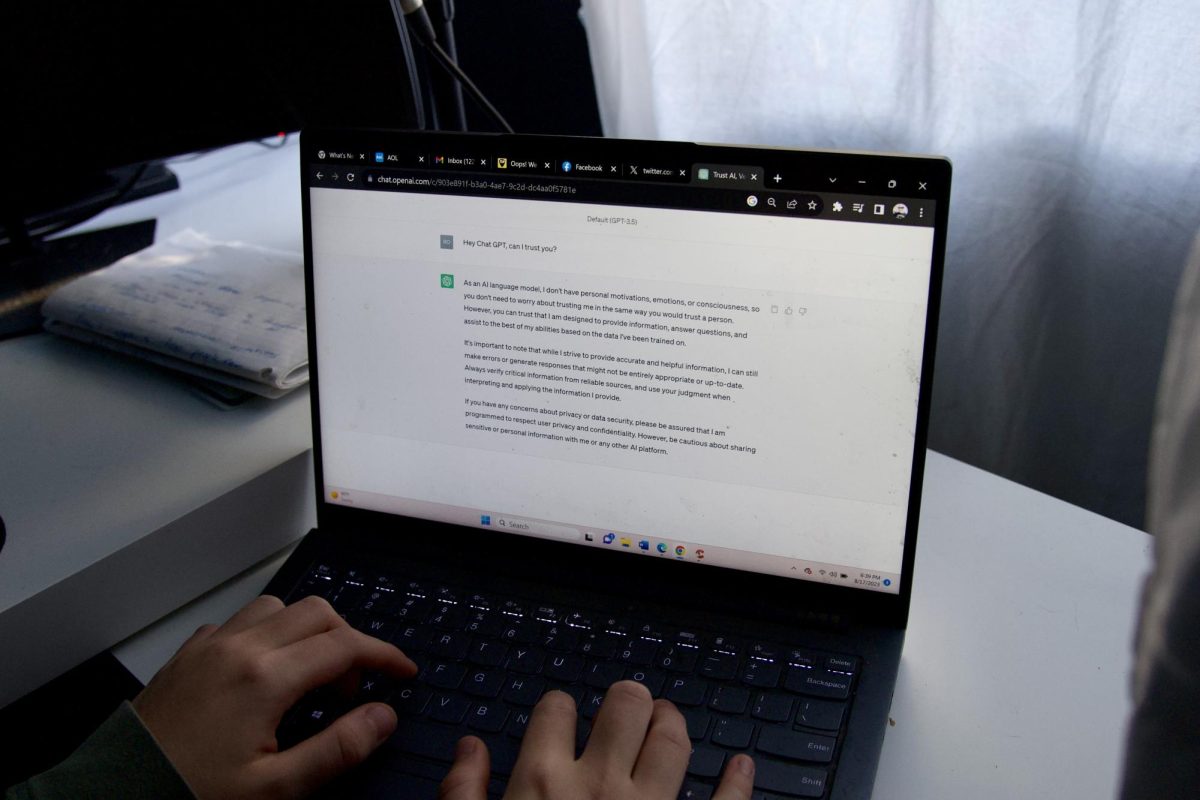I have spent the last few semesters living in fear of the dreaded ChatGPT and other artificial intelligence (AI) writing tools.
For those who are unfamiliar with it, ChatGPT stands for Chat Generative Pre-Trained Transformer. I learned this after having a conversation with the chatbot.
The “language model” is designed to answer questions in a “conversational manner” using its knowledge from the internet utilizing books, articles, websites and other online resources. However, ChatGPT is only able to reference information from up to 2021.
Before writing this article, I refused to open the software on my computer and had never personally tested it out. My only experience with it was from listening to my father ask ChatGPT to generate random rap songs about members of my family.
I did, however, spend some time on ChatGPT using a family member’s computer, so I could form the rest of my opinion before I wrote this.
Every syllabus I read has a scary contract that warns me not to use any of these tools for my assignments-even though it would personally never cross my mind to copy and paste or ask a robot to write my essay for me.
Because of this, I developed paranoia and resentment surrounding the existence of AI software.
I am reluctant to take online classes because of these new tools and the world of mistrust they have seemingly created between professors and students.
Professors are concerned about academic honesty and students are worried about getting good grades.
I have been in multiple classes where other students were accused of using AI to write essays or to respond to other assignments online. People and presumably professors, have access to artificial intelligence detection software, but it is unreliable and sometimes inaccurately detects plagiarism.
“People can use AI detection software, but it’s imperfect. It does make false detections, where it falsely detects original work as AI generated and it also doesn’t sometimes detect AI work as being AI work,” former Cal State LA English Department Chair Dr. Linda Margarita Greenberg said.
Greenberg hopes that society will be able to incorporate AI writing, while still leaving room for human-invention.
“My primary concern is that writing is a human activity in which we think, in which we learn and in which we explore and which we feel,” Greenberg added. “I worry that if as a people, if humans don’t get enough practice exploring their emotions in writing, exploring ideas in writing, because they’re too reliant on technology, that they might actually narrow their abilities, in order to imagine and create and be.”
She said it is crucial for faculty to emphasize the importance of process-based writing, where each draft in the revision process matters and you don’t put the most weight on the final version of the paper.
Students focus on pre-writing, revising drafts and taking small steps leading up to the submission of their final paper, which she says will foster originality and help students remember they have a voice.
After speaking to others and playing around with Chat GPT on my own, I learned that there are benefits to using these softwares as a tool for humans, but not as a replacement.
You can ask it to make to-do lists, write poems, essays, songs, caption posts and create recipes. Within seconds, an AI generated response to your question appears.
Cal State LA Film, Television and Theater master’s student and artist, Henry Meza sees, AI as a good tool for artists, but believes there should be rules and limitations on how people use the software. He works with an artist who has him take his already existing artwork and add to it, using AI in Adobe Photoshop.
When Meza uploads artwork into Photoshop (beta) AI, he can ask it to make different backgrounds or images, such as a heart made out of steel or cotton and fill in colors. He and his coworkers also use Chat GPT to create captions for Instagram posts.
“I think ultimately technological advances are for the better,” Meza said. “It’s going to reduce a lot of labor and time for artists to create and to make amazing art.”
He said that the software does not do all the work for you-it just gives you ideas.
In a post-pandemic world, we have adjusted to doing a lot of things online such as taking classes and working remotely. It is automatically much easier to cheat on assignments because many online classes require no face-to-face interaction.
As a professor, it must be frustrating knowing there is a possibility that some of your students are using these tools to cheat.
As a student who prides myself in writing out my own work, it frustrates me when people cannot be bothered to do the same.
As an aspiring journalist, I worry that AI may be a threat to my career. Will robots one-day replace us writers?
Google is already working on an artificial intelligence news writing software named Genesis, according to the New York Times.
We all have personal lives and when mixed with school things, it can become busy, overwhelming and stressful. So, I understand the desire to want to use AI when you are rushing to finish assignments and also want a good grade. I also understand wanting to use it, if writing is not your strong suit.
However, I think with too much assistance, people will lose their ability to articulate their thoughts using their own words.
I and many members of society, place a lot of trust and faith in technology and the information it provides, but I believe AI still has some learning to do.







